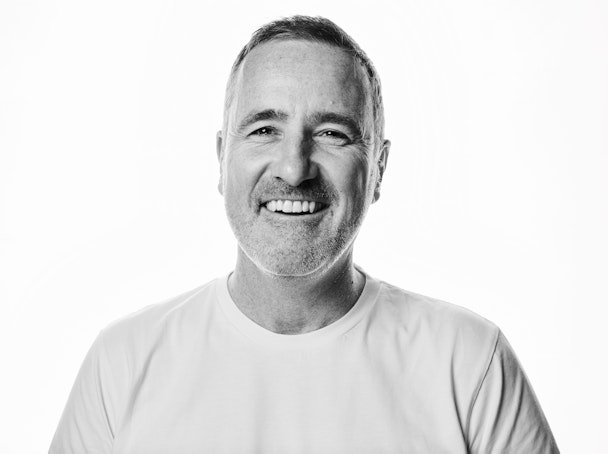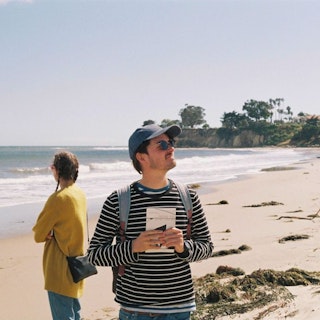100 days since acquisition by Accenture, Unlimited Group is bullish about future
In a string of marketing, data and tech acquisitions, Accenture Song snapped up Unlimited Group 100 days ago. Here, chief exec Chris Mellish shares the story so far and his vision for besting the ‘traditional’ networks.

Unlimited Group's Chris Mellish on Accenture Song sale, network agency dynamics, and AI / Credit: Unlimited Group
At the back end of last year, consulting behemoth Accenture made waves by bringing in one of the biggest names in British advertising to head up its marketing practice, Accenture Song. Dame Annette King, former chief executive of both Ogilvy and Publicis’ UK practices, came in as global comms lead before being immediately promoted to marketing practice lead, with responsibility for the group’s global network of creative agencies.
Arguably the biggest play of her tenure so far: the acquisition, back in April, of British agency group Unlimited, comprising over 600 staff across four main brands: creative agency TMW, comms shop Nelson Bostock, market research house Walnut, and a health practice.
Following the acquisition, Unlimited has retained those brands and will sit alongside Droga5 amid Song’s wider agency portfolio. But it has seen a change at the top, with Chris Mellish coming on as (Unlimited’s) group chief executive, having previously headed up TMW.
Explore frequently asked questions
Unlimited potential
Unlimited, formerly known as Creston, had been owned by private equity firm DBay advisors from 2016 until this year’s sale. Mellish’s predecessor Tim Hasset left Unlimited when the sale went through, having fulfilled what Mellish calls “the same purpose of all private equity businesses: reshaping, restructuring and getting it into a stronger position for sale” (other leadership stays in place, with Tim Bonnett remaining as president).
Hassett, says Mellish, “was brought in to do a certain job. We always knew that this transition would happen at the point of sale. It’s my job now to take it into this new world.”
Mellish acknowledges that the group “spoke to more than one potential suitor” about sale, but that going to Accenture allows Unlimited to maintain momentum in one direction: taking the fight to advertising’s behemoths. “Over the last few years,” Mellish says, “we’d had quite an enjoyable run taking on the big, traditional networks. We were enjoying those successes, and we were growing – against some industry trends.”
Accenture is, of course, a behemoth of its own kind – its 2023 revenues of $64bn dwarf those of what is usually thought of as the world’s biggest ‘traditional’ agency network, WPP ($19bn). In fact, some outlets have reported that Song’s own revenues are fast approaching WPP’s, at $18bn. The Drum hasn’t seen confirmation of these figures, but if they’re even close to accurate, Song is already one of the world’s biggest agency networks, making this less of a David v Goliath battle and more Goliath v Goliath.
But Mellish does think that Accenture has a new take on how to do marketing at this scale. Paraphrasing his new colleague King, Mellish says “the rules for how we operate and how we deliver for our clients have not been written yet. We can start to rewrite that group agency operating model in a way that is fit for purpose for brands.”
Advertisement
Is a new kind of network possible?
Unlimited is by no means Accenture’s only recent acquisition in the marketing space; over the last few months, it’s also brought in Brazilian creative agency Soko; Thai digital experience shop Rabbit’s Tale; American health marketing agency ConcentricLife; and a raft of digital product, data and AI shops. Its ambitions in this area are self-evident; Mellish says this amounts to nothing less than “a reinvention of what it means to be an agency group or a network, whatever you call it – that was quite exciting for us; they have a substantial vision that we felt we could really fit into and contribute to.”
Of course, Accenture is not the only player trying to build a new kind of agency network, but the fates of these ‘non-traditional’ players has been mixed of late. Sir Martin Sorrell’s S4 capital, long the posterchild for building an alternative kind of network, has been going through “difficult” times. The Brandtech Group, fresh off major agency acquisitions, has been cutting a more optimistic pose – but that’s seemingly thanks to its major bet on AI paying off, rather than ‘traditional’ marketing services.
Mellish argues that these varied fates come down to one question: of the players with the scale to work with big-budget brands, who can truly offer a ‘full service’? It’s no wonder, he says, that so much of the industry has “started to bolt things around their CRM and direct marketing agencies”, with moves like WPP’s ‘megamerger’ that brought VMLY&R and Wunderman Thompson together into a single entity, VML, last year.
Advertisement
“We do a lot of work with brands that want their CRM and their traditional advertising in a single place. Why? Because, they see their efficiencies in there; the real power in terms of delivering effectiveness in communications is to unlock that entire journey together.”
Here, Mellish says, some ‘heritage’ agencies may suffer; in a world where creative agencies have long dominated in terms of prestige, those without a background in the more data- and behavioural-driven disciplines of things like CRM may be at a disadvantage. “Some of those struggles may come from their heritage,” he says. “Traditional creative agencies have often led the charge, and it takes time to drive change. Conversely, though, if you come from a pure-play digital space, perhaps trying to orchestrate the whole piece in its entirety will also be difficult.
We come from a middle ground… it’s about controlling and understanding ideas from the middle outwards.”
So at a time when ‘CRM’ is hardly marketing’s sexiest acronym, Mellish is quite happy to claim it as the core of what Unlimited does, and what it offers the Accenture megaorganism. “Good marketing is always about orchestrating the entire customer experience from start to finish and understanding how you can pull the right levers at the right time to give the biggest possible return… That is the nub of it. Budgets are tight. Businesses are under pressure. We really need to prove that we’re delivering impact.”
Inevitably, though, Mellish argues that historical experience with CRM (or whatever else) won’t cut it without also mastering new technology, and one category of new tech in particular: AI. Those global network competitors have all bet big on the tech, making it the most likely battleground in the industry’s near-future macrodrama. Here, Mellish again hopes to put Unlimited at the heart of Accenture’s rapidly growing offering – thanks to its ‘human understanding lab’ of behaviour experts and data scientists.
“We’re looking to use that technology to democratize access to insights around human behavior at speed,” Mellish says. AI, for his firm, will be about “enabling our staff and clients to get understanding of human behavior at scale to develop more effective communication, so can we start to dissect groups of people not by demographics, but by their personality traits and behaviors. That insight can then start to fuel communications across the entire customer experience, not just within CRM but also above-the-line. Can we target people in a different way? Can we do it quickly? That democratization of genuine human understanding will help us, and help brands, to react and communicate in more effective ways.”
Suggested newsletters for you
Content created with:

UNLIMITED
UNLIMITED delivers business impact through human understanding. We’re an integrated tech-enabled agency group comprised of TMW, Walnut, Health Unlimited and Nelson...
Find out more